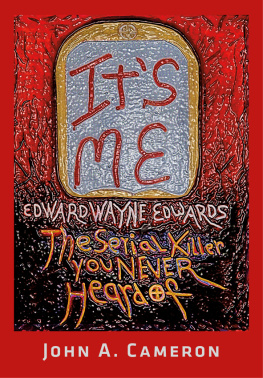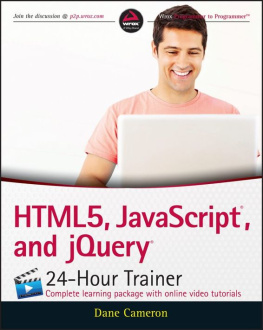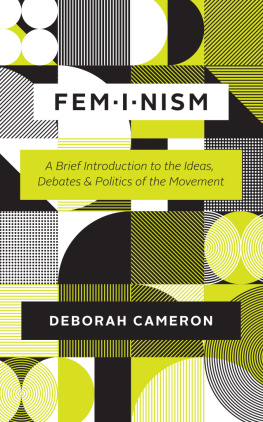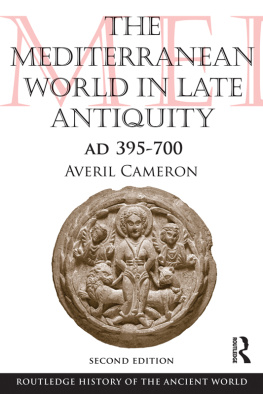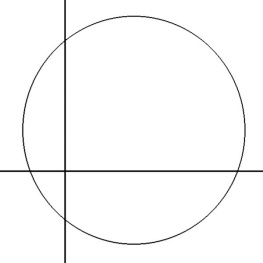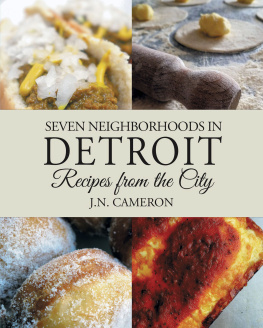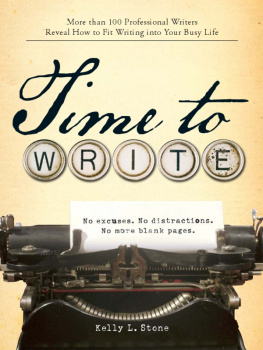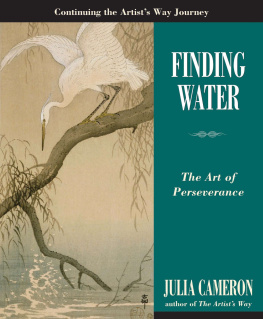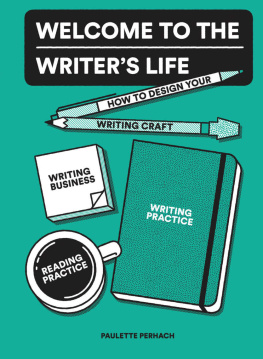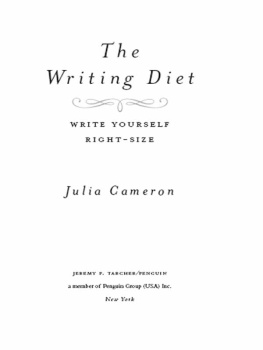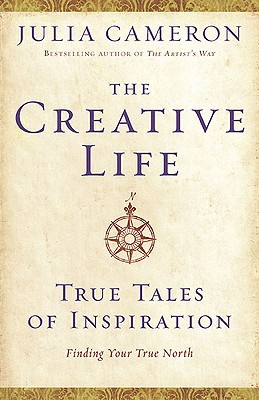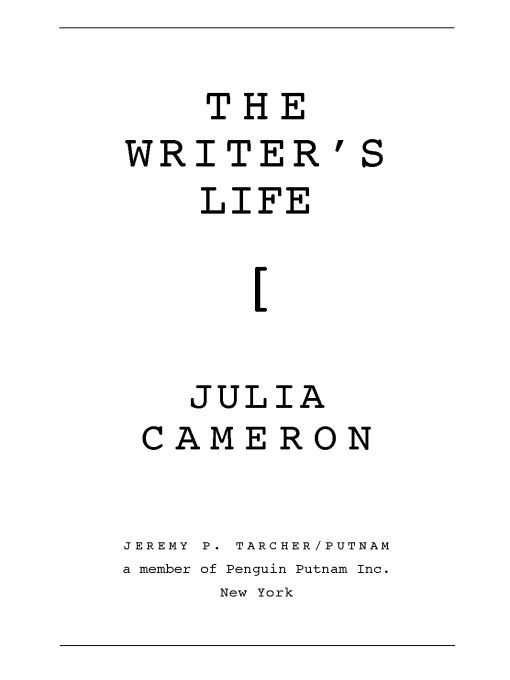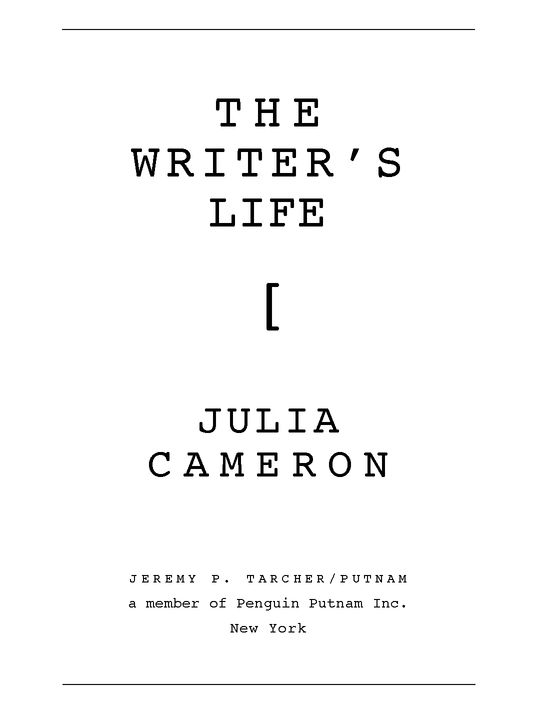Table of Contents
Also by Julia Cameron
nonfiction
The Artists Way (with Mark Bryan)
The Artists Way Morning Pages
Journal
The Artists Date Book
(illustrated by Elizabeth Cameron)
The Vein of Gold
The Right to Write
God Is No Laughing Matter
Supplies (illustrated by Elizabeth
Cameron)
God Is Dog Spelled Backwards
(illustrated by Elizabeth Cameron)
Heartsteps
Blessings
Transitions
The Artists Way at Work (with
Mark Bryan
and Catherine Allen)
Money Drunk, Money Sober (with
Mark Bryan)
fiction
The Dark Room
Popcorn: Hollywood Stories
plays
Public Lives
The Animal in the Trees
Four Roses
Love in the DMZ
Avalon (a musical)
The Medium at Large (a musical)
Normal, Nebraska (a musical)
poetry
Prayers for the Little Ones
Prayers for the Nature Spirits
The Quiet Animal
This Earth (also an album with Tim
Wheater)
feature films
Gods Will (writer/director)
AUTHORS NOTE
It is my hope that this book will dismantle some of the negative mythology that surrounds the writing life in our culture. I have found that life to be positive, invigorating, spiritually sourced, and eminently doable. In my experience, the writing life is a simple life, self-empowered and self-empowering. This book will be a cheerleader for those trying the writing life, a companion for those living it, and a thank-you to my own writing for the life it has given to me. It is my hope that this book will help to heal writers who are broken, initiate
Insights from The Right to Write
writers who are afraid, and entice writers who are standing at rivers edge, wanting to put a toe in.
Why should we write? We should write because it is human nature to write. Writing claims our world. It makes it directly and specifically our own. We should write because humans are spiritual beings and writing is a powerful form of prayer and meditation, connecting us to our own insights and to a higher and deeper level of inner guidance as well. We should write, above all, because we are writers whether we call ourselves writers or not. The Right to Write is a birthright, a spiritual dowry that gives us the keys to the kingdom. Higher forces speak to us through writing. Call them Inspiration, Muses, Angels, God, Hunches, Intuition, Guidance, or simply a good storywhatever you call them, they connect us to something larger than ourselves that allows us to live with greater vigor and optimism.
In our current culture, writing is not forbidden; it is discouraged. Hallmark does it for us. We shop for the card that is closest to what we wish to say. Schools drill us about how to say what we want to and the how-to involves things like proper spelling, topic sentences, and the avoidance of detours so that logic becomes the field marshal and emotion is kept at bay. Writing, as we are taught to do it, becomes an antihuman activity. We are forever editing, leaving out the details that might not be pertinent. We are trained to self-doubt, to self-scrutiny in the place of self-expression.
Most of us try to write too carefully. We try to do it right. We try to sound smart. We try, period. Writing goes much better when we dont work at it so much. When we give ourselves permission to just hang out on the page. For me, writing is like a good pair of pajamascomfortable. In our culture, writing is more often costumed up in a military outfit. We want our sentences to march in neat little rows, like well-behaved boarding-school children. Burn down the school. Save the books, perhaps, but get the teacher to tell you the real secrets: What does he write and read as a guilty pleasure? Guilty pleasure is what writing is all about. It is about attractions, words you cant resist using to describe things too interesting to pass up. And forget lofty motives.
We should write because writing brings clarity and passion to the act of living. Writing is sensual, experiential, grounding. We should write because writing is good for the soul. We should write because writing yields us a body of work, a felt path through the world we live in. Anton Chekhov advised actors, If you want to work on your acting, work on yourself. This same advice applies to working on our writing. Our writing life, our life as a writer, cannot be separated from our life as a whole. Start where you are. Its a luxury to be in the mood to write. Its a blessing but its not a necessity.
Well writtenwhat does that mean? In school it usually means clear, orderly thinking. Neat enough grammar. Lots of orderly facts. It may also mean things we are taught, like topic sentences and transitions. Very often it does not mean words that sing off the page, innovative word combinations, paragraphs of great free associations and digressionsall the gifts a young poet or novelist might have and want to use but not find useful under the scholarly discipline of an academic paper. Writing is like breathing, its possible to learn to do it well, but the point is to do it no matter what. I believe we come into life as writers. We are born with a gift for language, and it comes to us within months as we begin to name our world. Words give us power.
We put a lot of bunk around the notion of being a writer. We make a big deal out of putting words on paper instead of simply releasing them into the air. We have a mythology that tells us that writing is a torturous activity. Believing that, we dont even try it or, if we do, and if we find it unexpectedly easy, we stop, freeze up, and tell ourselves that whatever it is that were doing, it cant be real writing. What if there were no such thing as a writer? What if everyone simply wrote? What if there were no being a real writer to aspire to? What if writing were simply about the act of writing?
Writing is a lot like driving a country black-top highway on a hot summer day. There is a wavery magical spot that shimmers on the horizon. You aim toward it. You speed to get there, and when you do, the there vanishes. You look up to see it again, shimmering in the distance. You write toward that. I suppose some people might call this unrequited love or dissatisfaction. I think its something better. The act of writing, the aiming at getting it right, is pure thrill, pure process, as exciting as drawing back a bow. Hitting a creative bulls-eye, a sentence that precisely expresses what you see shimmering on the horizonthose sentences are worth the chase. But the chase itself, the things you catch out of the corner of your eyethats worth something too. I love it when I write well, but I love it when I write, period.
If we didnt have to worry about being published and being judged, how many more of us might write a novel just for the joy of making one? Why should we think of writing a novel as something we couldnt trythe way an amateur carpenter might build a simple bookcase or even a picnic table? What if we didnt have to be good at writing? What if we got to do it for sheer fun? What if writing were approached like whitewater rafting? Something to try just for the fact of having tried it, for the spills and chills of having gone through the rapids of the creative process.
When people undertake writing, it is often not with the agenda of writing but with the agenda of becoming a writer. We have an incredible amount of mystery, mystique, and pure bunk around exactly what the phrase means. The fact that the act of writing makes you a writer barely enters the equation at all. Instead, we come up with ideas like Real writers are published, or Real writers make a living from their writing. In a sense, we are saying, Real writers get validation from others that they are writers. With a product-not-process orientation like this, is it any wonder that the aspiring writer is seized by anxiety? Even those gifted with a silver tongue doubt that they are gifted with a silver pen. The blank page strikes them like a blank check where they may be asked to fill in too large an amount.


